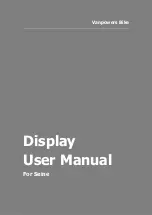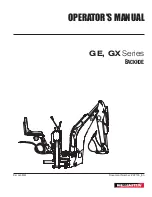
3
Warranty
Vernier warrants this product to be free from defects in materials and
workmanship for a period of five years from the date of shipment to the
customer. This warranty does not cover damage to the product caused by abuse
or improper use. This warranty covers educational institutions only.
Disposal
When disposing of this electronic product, do not treat it as household waste. Its
disposal is subject to regulations that vary by country and region. This item
should be given to an applicable collection point for the recycling of electrical
and electronic equipment. By ensuring that this product is disposed of correctly,
you help prevent potential negative consequences on human health or on the
environment. The recycling of materials will help to conserve natural resources.
For more detailed information about recycling this product, contact your local
city office or your disposal service.
Battery recycling information is available at
www.call2recycle.org
Do not puncture or expose the battery to excessive heat or flame.
The symbol, shown here, indicates that this product must not be disposed of
in a standard waste container.
Federal Communication Commission Interference Statement
This equipment has been tested and found to comply with the limits for a Class B digital device, pursuant to Part 15 of the FCC rules.
These limits are designed to provide reasonable protection against harmful interference in a residential installation. This equipment
generates, uses and can radiate radio frequency energy and, if not installed and used in accordance with the instructions, may cause
harmful interference to radio communications. However, there is no guarantee that interference will not occur in a particular installation. If
this equipment does cause harmful interference to radio or television reception, which can be determined by turning the equipment off and
on, the user is encouraged to try to correct the interference by one or more of the following measures:
Reorient or relocate the receiving antenna.
Increase the separation between the equipment and receiver.
Connect the equipment into an outlet on a circuit different from that to which the receiver is connected.
Consult the dealer or an experienced radio/TV technician for help.
FCC Caution
This device complies with Part 15 of the FCC Rules. Operation is subject to the following two conditions:
(1) this device may not cause harmful interference and
(2) this device must accept any interference received, including interference that may cause undesired operation
RF Exposure Warning
The equipment complies with RF exposure limits set forth for an uncontrolled environment. The antenna(s) used for this transmitter must
not be co-located or operating in conjunction with any other antenna or transmitter. You are cautioned that changes or modifications not
expressly approved by the party responsible for compliance could void your authority to operate the equipment.
IC Statement
This device complies with Industry Canada license-exempt RSS standard(s). Operation is subject to the following two conditions:
(1) this device may not cause interference, and
(2) this device must accept any interference, including interference that may cause undesired operation of the device.
Industry Canada - Class B
This digital apparatus does not exceed the Class B limits for radio noise emissions from digital apparatus
as set out in the interference-causing equipment standard entitled “Digital Apparatus,” ICES-003 of Industry Canada. Operation is subject
to the following two conditions: (1) this device may not cause interference, and
(2) this device must accept any interference, including interference that may cause undesired operation of the device.
To reduce potential radio interference to other users, the antenna type and its gain should be so chosen that the equivalent isotropically
radiated power (e.i.r.p.) is not more than that permitted for successful communication.
Exposing the battery to temperatures over 35°C (95°F) will reduce its lifespan. If
possible, store the device in an area that is not exposed to temperature extremes.
Water Resistance
Go Direct Gas Pressure is not water resistant and should never be immersed in
water.
If water gets into the device, immediately power the unit down (press and hold
the power button for more than three seconds). Disconnect the sensor and
charging cable, and remove the battery. Allow the device to dry thoroughly
before attempting to use the device again. Do not attempt to dry using an
external heat source.
How the Sensor Works
The sensor in this unit has a membrane that flexes as pressure changes. This
sensor is arranged to measure absolute pressure. One side of the membrane is a
vacuum, while the other side is open to the atmosphere. The sensor produces an
output voltage that varies in a linear way with absolute pressure. It includes
special circuitry to minimize errors caused by changes in temperature.
Troubleshooting
For troubleshooting and FAQs, see
www.vernier.com/til/3850
Repair Information
If you have watched the related product video(s), followed the troubleshooting
steps, and are still having trouble with your Go Direct Gas Pressure, contact
Vernier Technical Support at [email protected] or call 888-837-6437.
Support specialists will work with you to determine if the unit needs to be sent
in for repair. At that time, a Return Merchandise Authorization (RMA) number
will be issued and instructions will be communicated on how to return the unit
for repair.
Accessories/Replacements
Item
Order Code
Gas Pressure Sensor Replacement Parts
PS-ACC
#1 1-hole Rubber Stopper
PS-STOP1
#5 2-hole Rubber Stopper
PS-STOP5
Luer-Lock Connector
PS-LUER
Plastic 2-Way Valve
PS-2Way
Plastic Syringe
PS-SYR
Plastic Tubing
PS-TUBING
Plastic Tubing Clamps (Pack of 100)
PTC
Stopper Stem
PS-STEM
Vernier Micro USB Cable
CB-USB-MICRO
USB-C to Micro USB Cable
CB-USB-C-MICRO
Go Direct 300 mAh Replacement Battery
GDX-BAT-300






















